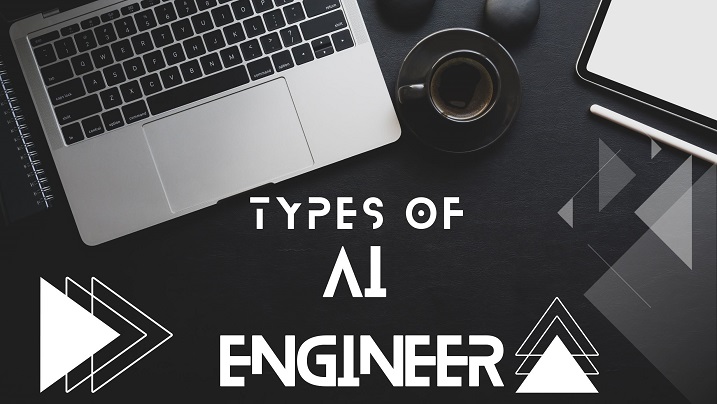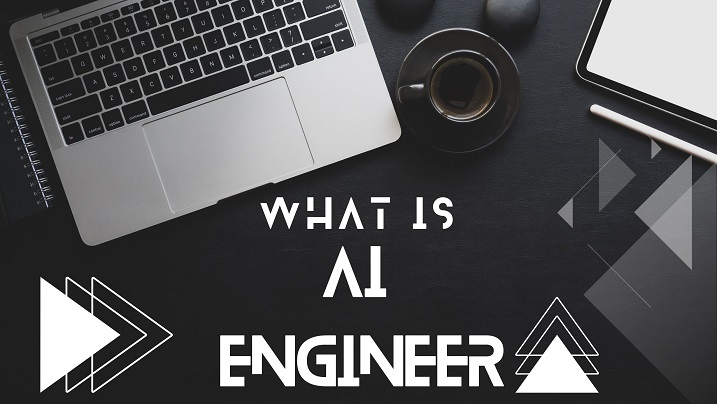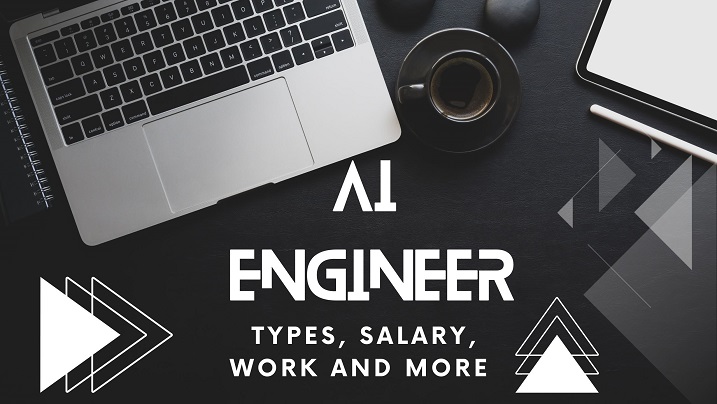AI Engineer – Types, Salary, Work and More in 2024
Hello friends, today we will know about Cloud AI Engineer.
What is AI Engineer?
AI Engineer is a professional who specializes in the development and deployment of artificial intelligence (AI) solutions.
AI Engineers are responsible for designing, building, testing, and deploying machine learning (ML) and deep learning (DL) models to solve real-world business problems.
They work with data scientists and software developers to develop AI-powered applications that can automate processes, optimize operations, and improve customer experiences.
Some of the key responsibilities of an AI Engineer include:
- Collaborating with data scientists and business stakeholders to identify business problems that can be solved with AI solutions.
- Developing and implementing AI algorithms, models, and software solutions that meet business requirements and user needs.
- Building and testing machine learning and deep learning models using various tools and platforms such as TensorFlow, PyTorch, and sci-kit-learn.
- Developing and implementing scalable and reliable AI architectures that can handle large volumes of data and traffic.
- Analyzing data to identify trends and patterns that can be used to improve AI models and algorithms.
- Deploying AI models to production environments and integrating them with other systems and applications.
- Monitoring and optimizing AI models to ensure their accuracy and efficiency over time.
- Developing and implementing data security and privacy measures to protect sensitive data used in AI solutions.
- Staying up-to-date with the latest AI technologies, trends, and best practices.
- Collaborating with other IT professionals to ensure that AI solutions are integrated with other systems and applications in the organization.
To become an AI Engineer, one typically needs a strong foundation in mathematics, statistics, and computer science.
An undergraduate degree in computer science, data science, or a related field is often required, along with experience in programming languages such as Python, Java, or C++.
Additionally, familiarity with machine learning and deep learning frameworks, such as TensorFlow and PyTorch, is essential. Pursuing advanced degrees and certifications in AI and related fields can also enhance an AI Engineer’s career prospects.

Types of AI Engineer
AI engineers can be broadly classified into the following types based on their area of specialization:
Machine Learning Engineer: These engineers specialize in building and deploying machine learning models that can learn from data and improve with experience.
Deep Learning Engineer: These engineers specialize in designing and deploying deep neural networks that can analyze and classify large amounts of complex data.
Natural Language Processing (NLP) Engineer: These engineers specialize in designing and building systems that can process, analyze and understand human language.
Computer Vision Engineer: These engineers specialize in designing and building systems that can interpret and analyze visual information from images and videos.
Robotics Engineer: These engineers specialize in designing and building robotic systems that can learn and adapt to their environment.
AI Researcher: These professionals work in research institutions or academia and are responsible for developing new theories, models, and algorithms in the field of AI.
How to become an AI Engineer
Becoming an AI engineer involves a combination of education, skills, and experience. Here are the steps you can take to become an AI engineer:
Get a bachelor’s degree in Computer Science, Mathematics, or a related field: A strong foundation in computer science and mathematics is essential for a career in AI engineering.
Learn programming languages: AI engineers need to be proficient in programming languages like Python, Java, and C++. You can start by learning these languages through online courses, tutorials, or by enrolling in a coding boot camp.
Learn data structures and algorithms: AI engineers need to have a strong understanding of data structures and algorithms to build efficient and scalable AI models.
Learn machine learning concepts: Machine learning is the foundation of AI, and AI engineers need to have a strong understanding of machine learning concepts like supervised learning, unsupervised learning, and reinforcement learning.
Gain practical experience: Participate in hackathons, internships, and open-source projects to gain hands-on experience in building AI models.
Pursue a master’s degree: A master’s degree in AI or a related field can provide you with in-depth knowledge and research experience in the field of AI.
Stay up-to-date with the latest developments: AI is a rapidly evolving field, and it’s important to stay up-to-date with the latest technologies, frameworks, and research.
Obtain relevant certifications: Industry-recognized certifications like AWS Certified Machine Learning Specialty, Microsoft Certified: Azure AI Engineer Associate and Google Cloud Professional Machine Learning Engineer can help demonstrate your expertise in AI engineering to potential employers.
What is the salary of an AI Engineer in India?
The salary of an AI Engineer in India varies depending on their experience, skillset, location, and the organization they work for. As per Glassdoor, the average salary of an AI Engineer in India is around ₹8,00,000 per annum.
However, the salary can range from ₹3,50,000 per annum to as high as ₹20,00,000 per annum based on the factors mentioned above.
What is the salary of an AI Engineer in Foreign Countries?
The salary of an AI Engineer in foreign countries varies widely depending on factors such as location, experience, skillset, and the industry they work in.
According to data from Payscale, the average salary of an AI Engineer in the United States is around $110,000 per year. However, this can range from $76,000 to $160,000 per year depending on the factors mentioned above.
In the United Kingdom, the average salary for an AI Engineer is around £50,000 per year, according to data from Indeed. However, salaries can range from £30,000 to £80,000 per year based on experience, location, and industry.
In Canada, the average salary for an AI Engineer is around CAD 97,000 per year, according to data from Neuvoo. However, salaries can range from CAD 63,000 to CAD 147,000 per year based on experience, location, and industry.
10 responsibilities of an AI Engineer
The responsibilities of an AI Engineer may vary depending on the organization they work for, but here are ten common responsibilities:
- Designing and developing AI models and algorithms for various applications
- Collecting and processing large datasets to train machine learning models
- Collaborating with cross-functional teams to identify business problems and develop AI solutions
- Evaluating the performance of AI models and making improvements as needed
- Staying up-to-date with the latest advancements in AI technology and applying them to the organization’s work
- Ensuring that AI solutions comply with ethical and legal standards
- Creating and maintaining documentation for AI models and projects
- Conducting experiments and testing to validate AI solutions
- Communicating complex technical information to non-technical stakeholders
- Providing guidance and support to other members of the AI development team
AI Engineer Specialist
An AI Engineer specialist is an experienced AI professional who specializes in designing, building, and implementing artificial intelligence and machine learning solutions.
They are responsible for designing and developing AI applications that help companies automate their processes and improve their performance. Here are some of the key responsibilities of an AI Engineer specialist:
Design and develop machine learning models: An AI Engineer specialist designs and develops machine learning models that can analyze data, learn from it, and provide insights that can be used to make informed decisions.
Implement AI solutions: The AI Engineer specialist works closely with the development team to implement AI solutions that meet the business requirements.
Evaluate and select AI tools and frameworks: An AI Engineer specialist evaluates and selects AI tools and frameworks that are suitable for the project requirements.
Develop data pipelines: The AI Engineer specialist builds data pipelines that can collect, process, and store large amounts of data that can be used to train machine learning models.
Perform data preprocessing and cleaning: An AI Engineer specialist preprocesses and cleans data to remove errors, missing values, and inconsistencies before feeding the data into machine learning models.
Test and validate AI models: The AI Engineer specialist tests and validates machine learning models to ensure they perform accurately and effectively.
Collaborate with cross-functional teams: The AI Engineer specialist collaborates with cross-functional teams, including data scientists, developers, and business analysts, to develop AI solutions that meet the business requirements.
Stay up-to-date with AI and machine learning advancements: The AI Engineer specialist stays up-to-date with the latest AI and machine learning advancements and integrates them into the company’s AI solutions.
Develop documentation and training materials: An AI Engineer specialist develops documentation and training materials that explain how the AI solution works and how it should be used.
Manage AI projects: The AI Engineer specialist manages AI projects from start to finish, ensuring they are delivered on time, within budget, and to the required quality standards.

FAQ
Is AI engineering a good career?
Yes, AI (Artificial Intelligence) engineering is considered a promising and rapidly growing career field. With the rise of automation and the increasing use of machine learning and AI in various industries, there is a high demand for AI engineers who can develop and implement these technologies.
AI engineers work on developing and implementing intelligent systems that can learn, reason, and solve problems.
They use various technologies such as natural language processing, computer vision, machine learning, and deep learning to create intelligent systems that can perform tasks that normally require human intelligence.
As AI technologies continue to advance and become more widespread, the demand for skilled AI engineers is expected to grow rapidly in the coming years, making it a potentially lucrative and rewarding career choice.
Are AI engineers paid well?
Yes, AI engineers are typically paid well due to the high demand for their skills and expertise. According to data from Glassdoor, the average base salary for an AI engineer in the United States is around $120,000 per year, with some earning over $200,000 per year.
Additionally, bonuses and stock options can add significantly to their total compensation. However, salary can vary depending on factors such as location, company, experience, and education.
What is required to become an AI engineer?
To become an AI engineer, you typically need to have a solid foundation in computer science and programming, as well as a strong understanding of machine learning and data science. Here are some common requirements:
Education: Most AI engineer positions require a bachelor’s degree in computer science, mathematics, or a related field. Some positions may require a master’s degree or Ph.D. in a related field.
Programming Skills: You should have a strong proficiency in at least one programming language, such as Python or Java. Experience with frameworks like TensorFlow, PyTorch, or Keras is also valuable.
Machine Learning Knowledge: A strong understanding of machine learning algorithms and techniques is essential. You should have experience with supervised and unsupervised learning, as well as experience with neural networks, deep learning, and reinforcement learning.
Data Science Skills: You should have a good understanding of data science concepts such as data preprocessing, feature extraction, and model evaluation. Experience with big data platforms like Hadoop and Spark is also valuable.
Problem-Solving and Analytical Skills: AI engineers should be able to think critically and solve complex problems. They should be able to analyze data and develop creative solutions to meet business needs.
Communication Skills: Strong communication skills are essential for AI engineers, as they often work with cross-functional teams and need to be able to explain complex technical concepts to non-technical stakeholders.
Continuous Learning: AI is a rapidly evolving field, and AI engineers need to be willing to continuously learn and adapt to new technologies and trends.
Is AI a stressful job?
Like any other job, AI engineering can have its level of stress. It is a demanding field that requires a lot of technical knowledge, creativity, problem-solving skills, and attention to detail. There may be deadlines to meet and challenging projects to complete.
However, AI engineers who are passionate about their work and have a good work-life balance can find the job rewarding and fulfilling. The level of stress can vary depending on the work environment, the company culture, and the specific role within the AI field.
Is AI better or data science?
AI (Artificial Intelligence) and Data Science are two distinct fields, but they are interconnected in many ways. Both fields are highly in-demand and offer lucrative career opportunities.
Data science primarily deals with extracting insights and knowledge from data using statistical and machine learning techniques.
Data scientists work with structured and unstructured data to uncover hidden patterns, trends, and insights that can be used to inform business decisions.
AI, on the other hand, focuses on building intelligent machines that can learn and solve problems like humans.
AI engineers build and train machine learning models, deep learning models, and other types of algorithms that can perform tasks such as natural language processing, computer vision, speech recognition, and robotics.
Both fields require a solid understanding of programming languages, mathematics, and statistics. Data science requires more statistical expertise, whereas AI requires more knowledge of machine learning algorithms and techniques.
In terms of which field is better, it ultimately depends on your interests and career goals. Both fields are highly in-demand and offer excellent career opportunities.
If you are interested in building intelligent machines and working on cutting-edge technologies such as computer vision, natural language processing, and robotics, then AI may be the better choice for you.
If you are more interested in working with data to uncover insights and inform business decisions, then data science may be a better fit.
Which is better AI or CS?
AI (Artificial Intelligence) and CS (Computer Science) are two distinct fields with different focuses and career paths, and it’s not necessarily accurate to compare them as “better” or “worse” than one another.
Computer Science is a broad field that covers many topics such as programming, algorithms, software engineering, computer architecture, and more.
In contrast, AI is a more specialized field that deals specifically with creating intelligent machines that can perform tasks that normally require human-like intelligence.
If someone is interested in creating intelligent systems or working with machine learning algorithms, then AI might be a better fit for them.
If they are interested in computer systems and software engineering, then computer science might be a better fit. Ultimately, the choice depends on an individual’s interests and career goals.
Is AI a hard job?
AI can be a challenging field to work in, especially for those who are not well-versed in mathematics and computer science.
However, with the right education, training, and experience, it can be a highly rewarding career. It requires a solid understanding of programming, data analysis, machine learning, and other related fields.
It also requires an ability to think creatively, problem-solve, and stay up-to-date with the latest advancements in the field. Like many jobs, the level of difficulty in AI can vary based on the specific role, organization, and project.
Does AI require coding?
Yes, AI (Artificial Intelligence) typically requires coding, as it involves programming machines to perform tasks that normally require human intelligence, such as learning, reasoning, perception, and decision-making.
AI engineers and data scientists usually use programming languages such as Python, R, Java, and C++, as well as libraries and frameworks like TensorFlow, Keras, PyTorch, and sci-kit-learn to build and train machine learning models, deep learning networks, natural language processing (NLP) systems, and other AI applications.
Is AI tough to study?
The difficulty level of studying AI can vary depending on several factors, including your background, level of interest, and the depth of knowledge you wish to acquire.
If you already have a strong foundation in computer science, mathematics, and programming, then studying AI may be relatively easier for you.
However, if you don’t have a technical background, you may need to put in more effort to understand the underlying concepts and principles of AI.
The field of AI is quite broad, and there are many different sub-fields, such as machine learning, natural language processing, computer vision, robotics, and more. Each of these sub-fields requires a different set of skills and knowledge, so the difficulty level may also depend on the specific area you are interested in.
That being said, AI is a rapidly evolving field, and there is always something new to learn. Keeping up with the latest research and advancements can be challenging, but it can also be rewarding and exciting.
In summary, the difficulty level of studying AI can vary, but with persistence, hard work, and a passion for learning, it is possible to become proficient in this exciting field.
Which has more salary AI or data science?
Both AI and data science are high-demand fields with lucrative salaries. The salary of professionals in these fields depends on several factors such as experience, education, location, and company.
In general, AI professionals, especially those with expertise in deep learning and machine learning, tend to have higher salaries than data scientists.
According to a recent survey by Indeed, the average salary for an AI engineer in the United States is around $146,000 per year, while the average salary for a data scientist is around $120,000 per year.
However, it’s worth noting that the salaries in both fields can vary significantly based on factors such as location, industry, company size, and level of experience.
Additionally, the salaries of both AI and data science professionals are likely to continue to evolve as the fields themselves continue to evolve and new applications for AI and data science emerge.
Overall, both AI and data science are promising fields with excellent earning potential, and individuals who pursue careers in these fields can expect to earn competitive salaries.
What is the salary of an artificial intelligence scientist?
The salary of an artificial intelligence scientist can vary based on several factors, such as experience, education, location, and company.
According to recent data from Glassdoor, the average base salary for an AI scientist in the United States is around $138,000 per year.
However, it’s worth noting that the salary of an AI scientist can range widely, depending on the specific job, industry, and location.
For example, AI scientists working in the technology and finance industries tend to earn higher salaries than those in other industries.
Similarly, AI scientists working in cities with a high cost of living, such as San Francisco or New York, may earn higher salaries to compensate for the higher living expenses.
Overall, the field of AI is rapidly growing and evolving, and salaries for AI scientists are likely to continue to increase in the coming years as demand for their skills increases.
Which language is best for AI?
There is no single “best” programming language for AI because the choice of language depends on the specific task and the tools and libraries available for that task. That being said, some of the most popular programming languages used for AI include:
Python: Python is one of the most popular programming languages for AI and machine learning due to its simplicity, readability, and vast collection of libraries and frameworks like TensorFlow, PyTorch, and sci-kit-learn.
R: R is another popular programming language for AI and machine learning, especially for statistical analysis and data visualization. R has many useful libraries, such as caret and ggplot2, for machine learning tasks.
Java: Java is widely used in enterprise applications and big data technologies such as Hadoop and Spark. Java is also useful for developing AI applications for Android devices.
C++: C++ is known for its speed and efficiency, making it a popular choice for developing AI applications that require high performance, such as computer vision and robotics.
MATLAB: MATLAB is a programming language that is widely used for scientific computing and data analysis. It has several toolboxes for machine learning tasks and is commonly used in research.
Overall, Python is the most popular programming language for AI and machine learning due to its simplicity, versatility, and abundance of libraries and frameworks. However, the choice of language ultimately depends on the specific task and the tools available for that task.
Is there an AI branch in IIT?
Yes, several Indian Institutes of Technology (IITs) offer AI-related programs and courses. IITs are among the most prestigious engineering and technology institutes in India and are well-known for their quality education and research.
Some of the IITs that offer AI-related programs include:
Indian Institute of Technology, Kharagpur (IIT Kharagpur) – Offers a Master’s program in Artificial Intelligence
Indian Institute of Technology, Hyderabad (IIT Hyderabad) – Offers a Bachelor’s program in Artificial Intelligence and Data Science
Indian Institute of Technology, Delhi (IIT Delhi) – Offers a Ph.D. program in Computational Biology, which includes research in AI and machine learning
Indian Institute of Technology, Bombay (IIT Bombay) – Offers a Master’s program in Data Science
Indian Institute of Technology, Madras (IIT Madras) – Offers a Master’s program in Data Science and a Ph.D. program in Computational Engineering
These programs offer students the opportunity to gain knowledge and skills in AI and related fields, such as machine learning, data science, and computational biology, among others.
In which college AI course is best?
Many colleges and universities offer courses in artificial intelligence (AI), and what makes a course “best” can depend on various factors such as your interests, goals, and background knowledge. That said, here are some factors to consider when choosing an AI course:
Course content: Look for courses that cover a broad range of AI topics, including machine learning, deep learning, natural language processing, computer vision, and robotics. Make sure the course is well-structured and covers both theoretical and practical aspects of AI.
Instructor Expertise: The instructor’s background and expertise in AI can greatly impact the quality of the course. Look for instructors who have a solid research background in AI and relevant publications.
Course format: Consider the course format, whether it is an online course, an in-person course, or a hybrid of both. Some courses may also have prerequisites or require prior knowledge of certain programming languages or mathematical concepts.
Resources and support: Check if the course provides additional resources such as textbooks, online tutorials, or access to relevant research papers. Additionally, make sure the course provides adequate support such as office hours, tutoring, or discussion forums.
Some of the top universities offering AI courses include Stanford University, Massachusetts Institute of Technology (MIT), Carnegie Mellon University, University of California Berkeley, and Georgia Institute of Technology.
However, many other universities and colleges offer excellent AI courses, so be sure to research and compare courses based on your specific needs and interests.
Can I learn AI in 3 months?
It is possible to learn some aspects of AI in 3 months, but it depends on your prior knowledge, learning goals, and the amount of time you can dedicate to learning each day.
AI is a vast field that encompasses many subfields, such as machine learning, deep learning, computer vision, natural language processing, and robotics.
If you are completely new to AI and programming, it may take more than 3 months to get a solid understanding of the fundamentals.
However, if you already have some programming skills and knowledge of statistics and linear algebra, you may be able to learn the basics of machine learning and deep learning in 3 months.
To learn AI in 3 months, you should create a structured learning plan that includes reading textbooks, taking online courses, and working on programming projects. Some recommended resources for learning AI include:
- “Machine Learning” by Andrew Ng (online course)
- “Deep Learning” by Ian Goodfellow, Yoshua Bengio, and Aaron Courville (textbook)
- “Python Machine Learning” by Sebastian Raschka (textbook)
- “Fast.ai” (online courses and practical projects)
It is important to note that learning AI is a continuous process, and 3 months may only be enough to get you started. To become an expert in AI, you will need to continue learning and staying up-to-date with the latest research and developments in the field.
Is C++ necessary for AI?
No, C++ is not necessary for AI, but it can be a useful language for developing some AI applications. C++ is a high-performance programming language that is often used for developing complex and computationally intensive systems.
It is known for its ability to handle large amounts of data and optimize code for efficient execution.
However, many other programming languages are commonly used for AI, such as Python, R, and Java. Python, in particular, has become the most popular language for AI and machine learning due to its ease of use, readability, and extensive libraries for scientific computing.
That being said, knowing C++ can be advantageous for developing certain AI applications that require high performance and low-level access to hardware, such as robotics and computer vision systems.
Additionally, some AI frameworks, such as TensorFlow, allow for the use of C++ for developing custom operations and optimizing performance.
In summary, while C++ is not necessary for AI, it can be a useful tool for certain applications, but Python remains the primary language for most AI development.
Is AI coding hard?
The difficulty of coding for AI can depend on several factors, such as your background knowledge, the specific AI application you are working on, and the level of complexity required.
If you have a solid foundation in programming concepts and a good understanding of linear algebra, statistics, and probability, then coding for AI may not be as challenging.
However, if you are new to programming, then learning the basics of AI and machine learning can be challenging at first.
Additionally, the difficulty of AI coding can vary depending on the specific application you are working on.
Some AI applications, such as image classification or sentiment analysis, can be relatively straightforward to implement, while others, such as natural language processing or robotics, can be more complex and require advanced algorithms and mathematical models.
Overall, AI coding can be challenging but also rewarding. With the right resources, practice, and determination, it is possible to develop the skills needed to code for AI successfully.
There are many online resources available, such as online courses, tutorials, and forums, to help you get started and improve your skills.
Where can I study AI for free?
There are many online resources available to study AI for free, including courses, tutorials, and interactive projects. Here are some of the best free resources for studying AI:
Coursera: Coursera offers many free courses on AI and machine learning from top universities around the world, such as Stanford, MIT, and the University of Toronto. You can audit these courses for free, but if you want a certificate, you will need to pay a fee.
edX: edX also offers many free courses on AI and machine learning, including introductory courses and more advanced courses from top universities like Harvard, UC Berkeley, and Microsoft.
Fast.ai: Fast.ai is a free online course on deep learning that covers the latest techniques and practical applications of AI. It is designed for beginners and requires only a basic knowledge of Python programming.
TensorFlow: TensorFlow is an open-source AI framework developed by Google that offers many free tutorials and guides for learning AI and machine learning using TensorFlow. You can also find free courses on TensorFlow on websites like Udacity and Coursera.
Kaggle: Kaggle is a platform for data science competitions that offers many free datasets and tutorials for learning machine learning and AI. You can participate in competitions or work on projects independently.
MIT OpenCourseWare: MIT OpenCourseWare offers free access to many courses from MIT, including courses on AI and machine learning. These courses include lecture videos, assignments, and exams.
These are just a few examples of the many free resources available for learning AI online. By utilizing these resources and others like them, you can gain the skills and knowledge necessary to succeed in the field of AI.
How long is an AI degree?
The length of an AI degree can vary depending on the program and the level of education. Typically, an undergraduate degree in AI, such as a Bachelor of Science in Artificial Intelligence or a Bachelor of Science in Computer Science with a concentration in AI, takes around 4 years to complete.
A Master’s degree in AI, such as a Master of Science in Artificial Intelligence or a Master of Science in Computer Science with a focus on AI, usually takes 1-2 years to complete, depending on the program and whether it is completed full-time or part-time.
A doctoral degree in AI, such as a Ph.D. in Artificial Intelligence or a Ph.D. in Computer Science with a focus on AI, typically takes around 4-5 years to complete but can take longer depending on the research project and individual progress.
It’s important to note that the length of an AI degree may also depend on the specific requirements of the program, such as the number of required courses, research projects, and internships.
In addition, some universities may offer accelerated or combined degree programs that allow students to earn both an undergraduate and graduate degree in AI in a shorter amount of time.
Is AI engineering in demand?
Yes, AI engineering is in high demand due to the increasing adoption of AI and machine learning technologies across various industries.
AI engineering is a field that involves the development, deployment, and maintenance of AI systems and applications.
According to the U.S. Bureau of Labor Statistics, employment in computer and information technology occupations, including AI engineering, is projected to grow 11 percent from 2019 to 2029, much faster than the average for all occupations.
This growth is expected to be driven by the continued demand for mobile computing, cloud computing, and AI and machine learning technologies.
In addition, according to the World Economic Forum’s Future of Jobs Report 2020, AI and machine learning specialists are projected to be among the most in-demand roles in the coming years, with a projected growth rate of 37 percent from 2020 to 2025.
Overall, the demand for AI engineering is expected to continue to grow as more industries and organizations look to leverage AI technologies to improve their operations, increase efficiency, and gain a competitive advantage.
Is btech in AI and data science good?
Yes, pursuing a B.Tech in AI and Data Science can be a good option for students interested in the fields of artificial intelligence and data science. A B.Tech in AI and Data Science program typically combines computer science, mathematics, statistics, and machine learning to provide students with a strong foundation in the theory and application of AI and data science.
Some potential benefits of pursuing a B.Tech in AI and Data Science include:
High demand: AI and data science are growing fields, and there is a high demand for professionals with the skills and knowledge in these areas. Pursuing a B.Tech in AI and Data Science can provide you with the necessary skills to enter this job market and pursue a career in these fields.
Versatility: AI and data science skills are relevant across various industries and sectors, including healthcare, finance, transportation, and more. This versatility can provide you with many job opportunities and career paths.
High-paying jobs: According to PayScale, the average salary for an AI engineer in India is around Rs. 8 lakhs per year, and the average salary for a data scientist is around Rs. 7 lakhs per year. Pursuing a B.Tech in AI and Data Science can increase your chances of landing high-paying jobs in these fields.
Innovation: Pursuing a B.Tech in AI and Data Science can provide you with the opportunity to be at the forefront of technological innovation. You can work on developing new AI applications and tools that can make a difference in people’s lives.
Overall, a B.Tech in AI and Data Science can be a good option for students interested in pursuing a career in these fields. However, it’s important to research the specific program and university to ensure that it aligns with your career goals and provides the necessary skills and knowledge for success in the field.
How do I start a career in AI?
Starting a career in AI involves several steps, including education and training, building a strong foundation in programming and data analysis, gaining experience, and networking with professionals in the field. Here are some steps you can follow to start a career in AI:
Learn the fundamentals of AI: Start by learning the fundamentals of AI, including machine learning, deep learning, natural language processing, and computer vision.
You can take online courses or attend workshops and boot camps to gain knowledge and skills in these areas.
Build a strong foundation in programming and data analysis: AI has based on programming and data analysis, so it’s important to have a strong foundation in these areas.
Learn programming languages such as Python, R, and C++ and gain experience in data analysis and manipulation.
Gain experience: Participate in projects, internships, or work on personal projects to gain experience in AI. This can help you build a portfolio of projects to showcase your skills and experience to potential employers.
Network with professionals in the field: Attend conferences, workshops, and meetups to network with professionals in the field. Connect with people on LinkedIn and join online forums and communities to stay up-to-date on industry trends and connect with other professionals.
Pursue a degree or certification: Pursuing a degree or certification in AI can be beneficial for starting a career in this field. Many universities offer undergraduate and graduate programs in AI, and there are also several online certification programs available.
Apply for jobs: Once you have the necessary skills, experience, and credentials, you can start applying for jobs in AI. Look for job openings on online job portals, LinkedIn, and company websites.
Starting a career in AI requires continuous learning and staying up-to-date with the latest trends and technologies in the field. Be prepared to invest time and effort into your education and training, and be open to learning new skills and technologies as you progress in your career.
Can a non-IT person learn AI?
Yes, a non-IT person can learn AI, but it may require some effort and dedication. AI involves a combination of programming, mathematics, statistics, and data analysis, so having some background or knowledge in these areas can be helpful. However, it is not necessary to have an IT background to learn AI.
Here are some steps a non-IT person can take to learn AI:
Start with the basics: Begin by learning the fundamentals of AI, including machine learning, deep learning, and natural language processing. Take online courses, read books and articles, and watch videos to gain knowledge and skills in these areas.
Learn programming languages: AI involves programming, so it’s important to learn programming languages such as Python, R, and C++. There are many online resources available to learn these languages, including tutorials, books, and online courses.
Practice with real-world problems: Apply your AI knowledge and skills to real-world problems by working on projects, participating in hackathons, and building your own AI applications.
This can help you gain practical experience and build a portfolio of projects to showcase your skills.
Collaborate with others: Collaborate with other people who are learning AI or are working in the field. Join online communities, participate in forums, and attend meetups to network with other professionals.
Stay up-to-date: AI is a rapidly evolving field, so it’s important to stay up-to-date with the latest trends and technologies. Read blogs, attend conferences, and participate in online courses to stay current with the latest developments.
In summary, while having an IT background can be helpful, a non-IT person can learn AI by starting with the basics, learning programming languages, practicing with real-world problems, collaborating with others, and staying up-to-date with the latest trends and technologies.
Investment Banker | Chartered Accountant | IT Manager | Dentist | Software Architect | Orthodontist | Data Scientist | Psychiatrist | Physician | Surgeon | Cloud Engineer | Full Stack Developer | Sales Director | Corporate Lawyer | Blockchain Developer | Marketing Manager | Petroleum Engineer
Can I get a job in AI as a fresher?
Yes, it is possible to get a job in AI as a fresher, but it may require some effort and dedication. Here are some tips to increase your chances of getting a job in AI as a fresher:
Gain knowledge and skills in AI: Start by learning the fundamentals of AI, including machine learning, deep learning, natural language processing, and computer vision. Take online courses or attend workshops and boot camps to gain knowledge and skills in these areas.
Build a strong foundation in programming and data analysis: AI has based on programming and data analysis, so it’s important to have a strong foundation in these areas. Learn programming languages such as Python, R, and C++ and gain experience in data analysis and manipulation.
Participate in projects: Participate in projects, internships, or work on personal projects to gain experience in AI. This can help you build a portfolio of projects to showcase your skills and experience to potential employers.
Create a strong resume: Create a strong resume that highlights your skills, education, and experience. Tailor your resume to the job you are applying for, and make sure it stands out from other applicants.
Network with professionals in the field: Attend conferences, workshops, and meetups to network with professionals in the field. Connect with people on LinkedIn and join online forums and communities to stay up-to-date on industry trends and connect with other professionals.
Apply for entry-level positions: Look for entry-level positions in AI, such as data analyst, machine learning engineer, or data scientist. Apply for jobs on online job portals, LinkedIn, and company websites.
Starting a career in AI requires continuous learning and staying up-to-date with the latest trends and technologies in the field.
Be prepared to invest time and effort into your education and training, and be open to learning new skills and technologies as you progress in your career.
Is AI a good future career?
Yes, AI is considered a good future career as it has a high demand and is expected to grow rapidly in the coming years.
AI is already being used in various industries such as healthcare, finance, transportation, and more. With advancements in AI, there will be a need for professionals who can design, develop, and implement AI-based solutions to solve complex problems.
According to a report by the World Economic Forum, AI is expected to create millions of new jobs by 2025, and many existing jobs will be transformed by AI. This means that there will be a high demand for AI professionals with the necessary skills and expertise.
Some of the job roles in AI include:
- Machine learning engineer
- Data scientist
- AI research scientist
- Natural language processing (NLP) Engineer
- Robotics engineer
- Computer vision engineer
- AI ethicist
- Business intelligence developer
If you have a passion for technology, data analysis, and problem-solving, then a career in AI can be a good choice for you.
However, keep in mind that the field is highly competitive, and it requires continuous learning and staying up-to-date with the latest trends and technologies in the field.





